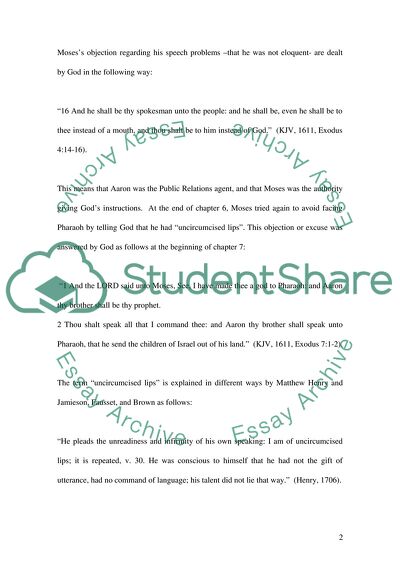
- Home
- Free Samples
- Premium Essays
- Editing Services
- Extra Tools
- Essay Writing Help
- About Us
- Studentshare
- Subjects
- Miscellaneous
- Educational Leadership -Biblical Character Analysis for Public Relations Class
Educational Leadership -Biblical Character Analysis for Public Relations Class - Essay Example
Aaron, Moses’ elder brother, is considered…

- Subject: Miscellaneous
- Type: Essay
- Level: Undergraduate
- Pages: 4 (1000 words)
- Downloads: 0
- Author: darelayla
Extract of sample "Educational Leadership -Biblical Character Analysis for Public Relations Class"
Aaron, as Moses’ spokesman, dealt with two publics: the nation of Israel and Pharaoh. Everything began when Moses got the revelation of God at the bush. God commanded him to be His ambassador for the deliverance of His people who were slaves in Egypt under the strong hand of Pharaoh. Moses made some objections trying to avoid the commitment of doing God’s will. His main excuse is answered with the revelation of the sacred name of God, Yahweh or Jehovah, and its powerful meaning (Exodus 3:13-14).
In Chapter 4, Moses keeps making objections trying to avoid God’s commission. Matthew Henry argues as follows dealing with the objection made by Moses about his speech problems: “2. Moses objects his own slowness of speech (v. 10), and begs to be excused (v. 13); but God answers this objection, (1.) By promising him his presence (v. 11, 12). (2.) By joining Aaron in commission with him (v. 14–16).” (Henry, 1706). This means that Aaron was the Public Relations agent, and that Moses was the authority giving God’s instructions.
At the end of chapter 6, Moses tried again to avoid facing Pharaoh by telling God that he had “uncircumcised lips”. This objection or excuse was answered by God as follows at the beginning of chapter 7: “He pleads the unreadiness and infirmity of his own speaking: I am of uncircumcised lips; it is repeated, v. 30. He was conscious to himself that he had not the gift of utterance, had no command of language; his talent did not lie that way.” (Henry, 1706). “A metaphorical expression among the Hebrews, who, taught to look on the circumcision of any part as denoting perfection, signified its deficiency or unsuitableness by uncircumcision.
The words here express how painfully Moses felt his want of utterance or persuasive oratory.” (Jamieson, Fausset, & Brown, 1871). “He again nominates him an
...Download file to see next pages Read More
- TERMS & CONDITIONS
- PRIVACY POLICY
- COOKIES POLICY